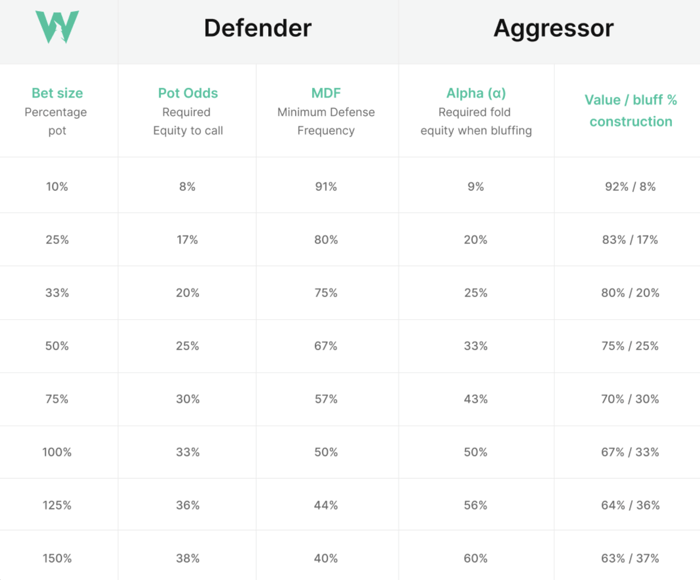[ad_1]
Pot odds are a fundamental concept in poker that help players assess the value of a call by weighing risk against reward.
Essentially, pot odds tell you what percentage of the pot you need to win to make a call worthwhile over the long term.
Calculating pot odds is straightforward, yet mastering this skill can significantly improve your decision-making at the table. In this article, GTO Wizard tells you how you can get to grips with the basics.
Go From Muggle to Wizard with a GTO Wizard Training Plan
Pot Odds Simplified
Simply put, pot odds relate to the amount of money in the pot compared to the amount you must put in the pot to continue playing.
Example:
Let’s say you’re in a hand where there is $300 in the pot and your opponent bets $100, meaning now there is $400 in the middle. As you need to call $100 to see the next card, your pot odds are 4:1 as 100 goes into 400 four times.
Pot odds also apply to draws. For instance, suppose you have a draw to the nut flush with one card left to come. In this case, you are about a 4:1 underdog to make your flush. If it costs you $100 to call the bet, then there must be at least $400 in the pot (including the most recent bet) to make your call correct.
If you’re someone who prefers to calculate using percentages rather than odds, you can determine the equity required for a call with the below formula:
Required Equity to Call = (Call Amount) / (Total Pot After Calling)
For instance, if we need to call $10 and the total pot after calling would be $40 (our $10 call plus the existing $20 pot and an opponent’s $10), we get:
Required Equity = $10 / $40 = 25%
This means we need to win at least 25% of the time after making this call to break even on our investment. Ideally, we’d aim to win more frequently, but if our chances fall below 25%, the call becomes unprofitable.
Should You Straddle? According to GTO Wizard, The Short Answer is No
Pot Odds Cheat Sheet
For players who aren’t comfortable with math, using a cheat sheet can simplify things. GTO Wizard has created one for easy reference: just find your opponent’s bet size in the first column, and the second column will show you how often you need to win to make a profitable call.

Calculating Pot Odds and Outs
Learning how to calculate pot odds rather than relying on an odds calculator is an important skill to have, especially when playing live poker as you can’t exactly whip out a calculator at the table during a hand.
So, if there’s $100 in the pot and you are facing a bet of $20, the pot is now $120. To calculate your pot odds, divide the 120 (pot size) by 20 (bet to call) and you get six. Therefore, your pot odds are 6:1.
By calculating the pot odds, you can figure out whether you’re getting the right price to call
Example:
You have J♥10♥ on a flop of K♠6♥3♥ and now have hopes of hitting your flush. To work out the odds of hitting your flush, figure out how many outs to the flush you have, in this case, it would be nine as there are 13 hearts in the deck, and four are already accounted for.
To roughly figure out the probability of you hitting your flush on the turn or river, multiply the number of outs that you have (nine) by four and you’ll come up with an approximate percentage. In this case, it would be 36%, and when using the pot size example above, you would be getting a favorable price to call.
Watch the Full Video
While the above covers the basics of pot odds, the GTO Wizard video goes into greater detail on the topic.
Other scenarios covered include:
- The limitations of pot odds
- Implied Odds
- Equity Realization
- GTO Wizard Examples
[ad_2]
Source link

